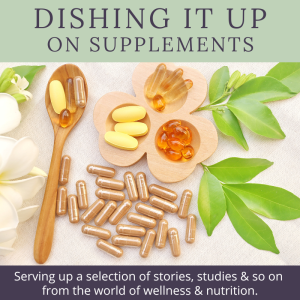Dietary  supplements are big business. According to Types of Supplements: 2022–2023 Trends, a report from NutraScience Labs, the global market is projected to increase to US$272.4 billion by 2028. Regulatory practices vary widely [click here re: Canadian regulation of natural health products] and there have been reports of supplement companies making unfounded health claims. Some investigations have uncovered products that don’t contain the active ingredients they claim to (either in the labelled quantity or at all). And, as with any lucrative industry, it has its share of promoters who are motivated as much (or more) by boosting profits as by improving the health of the consumer. Also of concern is the misconception that supplements can do no harm because they are “natural” and readily available. But they can do harm if not taken appropriately, negatively interacting with prescription or other medications, for example.
supplements are big business. According to Types of Supplements: 2022–2023 Trends, a report from NutraScience Labs, the global market is projected to increase to US$272.4 billion by 2028. Regulatory practices vary widely [click here re: Canadian regulation of natural health products] and there have been reports of supplement companies making unfounded health claims. Some investigations have uncovered products that don’t contain the active ingredients they claim to (either in the labelled quantity or at all). And, as with any lucrative industry, it has its share of promoters who are motivated as much (or more) by boosting profits as by improving the health of the consumer. Also of concern is the misconception that supplements can do no harm because they are “natural” and readily available. But they can do harm if not taken appropriately, negatively interacting with prescription or other medications, for example.
Caveats aside, however, there is a place for high quality supplements when used judiciously. They come in a wide variety of formulations (and quality) so it is a good idea to first speak with a knowledgeable healthcare practitioner who will be able to ensure you have no contraindications for use and advise you on the formulation, dosage and duration of use that will work best for you. And always inform your doctor(s) and pharmacist of any and all nutritional supplements you are taking.
Food first, supplements second
One last comment before diving into the stories. Improving your diet should always come first. Whole foods contain multiple nutrients with synergistic effects that make them not only more readily absorbed by your body but also more effective. Supplements have their place, but they cannot match the effectiveness of foods and should never be considered an appropriate substitute for a poor diet.
Below are some recent stories of interest as well as a handout on how to read labels. The final story is about hydration. This may seem out of place but many common complaints, such as headache, muscle cramps, low energy and so forth, might well be improved by proper hydration. This, along with eating nutritious whole foods, will do more to improve your health than a whole handful of supplements, not to mention it will be less expensive.
This month in Dishing It Up on Supplements …
- People With Cancer Should Be Wary of Taking Dietary Supplements
- 11 Supplements That May Be Worth Taking
- Don’t Rely on Amazon for Legitimate Supplements, Study Finds
- How to read a supplement label
- How staying properly hydrated may help you live healthier, longer
Read on for a bite-sized summary and links for each story …
People With Cancer Should Be Wary of Taking Dietary Supplements
“Drug-supplement interactions are complex, often varying by supplement, cancer, and treatment type, and can do more harm than good. Popular dietary supplements may, for instance, cancel the effects of a cancer treatment, making it less effective, or increase serious side effects, such as liver toxicity” yet “some dietary supplements can be helpful. Most patients with cancer ‘are malnourished and missing out on nutrients they could be getting from food’.”
Read more …
11 Supplements That May Be Worth Taking
“Searching for a supplement can certainly be confusing. Keep reading for a breakdown of the top 11 supplements that you may want to consider.” As mentioned above, I recommend you seek the advice of a qualified health professional before starting a new supplement regimen.
Read more …
Don’t Rely on Amazon for Legitimate Supplements, Study Finds
“If you order supplements on Amazon, you could be getting products that don’t offer what the labels claim. Looking for supplements that are third-party or GMP certified can help you reduce your risk of getting a product that’s not what it claims to be.”
Read more …
How to read a supplement label
“There are some tricks to understanding dietary supplement labels well, so be sure to pay attention to the following points when you’re evaluating your supplements.”
Read more …
How staying properly hydrated may help you live healthier, longer
“A new study from researchers at the U.S. National Institute of Health (NIH) reports that middle-aged people who have higher serum sodium levels in their blood are more likely to experience poor health and a higher risk of early mortality.”
Read more …
Want to receive Dishing It Up and other blog posts from The Nutritional Reset direct to your inbox?
Join The Nutritional Reset community here to receive each month’s edition of Dishing It Up, as well as exclusive recipes and more, direct to your inbox!